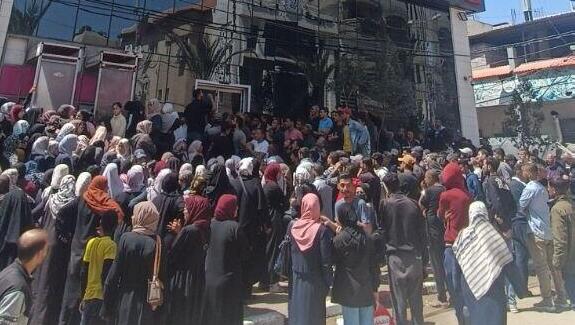Hamas Confronts Its Most Severe Financial Crisis Amid Ongoing Conflicts

Hamas, the Palestinian militant group governing the Gaza Strip, is currently enduring its most profound financial crisis ever recorded. According to a report published on Saturday by the Saudi-owned daily, Asharq Al-Awsat, government employees in Gaza have been receiving a meager salary of only 900 shekels, equivalent to approximately $250, for the past four months. This significant reduction in salary highlights the dire economic conditions that have been exacerbated by ongoing conflicts and financial constraints.
The persistent delays and cuts in salaries have intensified the already critical living conditions in the Hamas-controlled enclave. Many families are struggling to make ends meet, as inflation and the cost of basic necessities continue to rise.
Sources within Hamas disclosed to Asharq Al-Awsat that the organization is currently grappling with a serious financial crisis, affecting not only civil servants but also members of its military wing, the Izz ad-Din al-Qassam Brigades, along with several other affiliated institutions. Reports indicate that funding for various social services and ministries has been nearly suspended for over four months, drastically limiting the public services that many rely on.
Notably, the Qassam Brigades have reportedly not compensated their fighters for approximately three months, leading to acute shortages of military supplies. Additionally, families of deceased and injured Hamas members are no longer receiving the consistent financial support they used to depend on during the war, marking a significant shift in the group’s operational dynamics.
As the situation worsens, an administrative vacuum has emerged within Gaza’s Hamas-run government. Sources reported that the organization is struggling to fill critical leadership roles, largely due to Israel's targeted strikes against individuals perceived to be attempting to restore or facilitate government functions. Despite these overwhelming challenges, Hamas’ military command structure continues to operate, although they face ongoing operational difficulties in both northern and southern Gaza due to the relentless Israeli military actions.
These developments follow a report by the Wall Street Journal last month, which cited intelligence sources claiming that Hamas was on the brink of bankruptcy as a result of sustained Israeli strikes and a recent halt in humanitarian aid—aid that has since resumed. According to these sources, many government employees have stopped receiving their salaries, with even senior Hamas officials experiencing a pay cut of up to half during the month of Ramadan.
The current financial shortage reveals a deep-seated organizational dysfunction within the militant group, which is now grappling with renewed hostilities and struggling to recruit new fighters without the promise of payment. Prior to the outbreak of the current war, Hamas reportedly received around $15 million monthly in cash transfers from Qatar, which also played a role in fundraising efforts for the group across West Africa, South Asia, and the United Kingdom. Arab and Western officials assert that much of Hamas’ reserve funds, estimated to be around $500 million, are currently stored in Turkey.
In an effort to maintain control, Israel has restricted the flow of cash into Gaza since the conflict escalated. Palestinian sources informed the Wall Street Journal that Hamas has seized approximately $180 million from various Palestinian bank branches across the enclave to bolster its finances. Previously, the group supplemented its income through customs duties at border crossings, taxes on merchants, and trade operations that relied on foreign cash to import goods for sale within Gaza.
Despite these reports detailing the financial difficulties, Hamas has yet to issue a public statement responding to the claims made regarding its financial status.



























